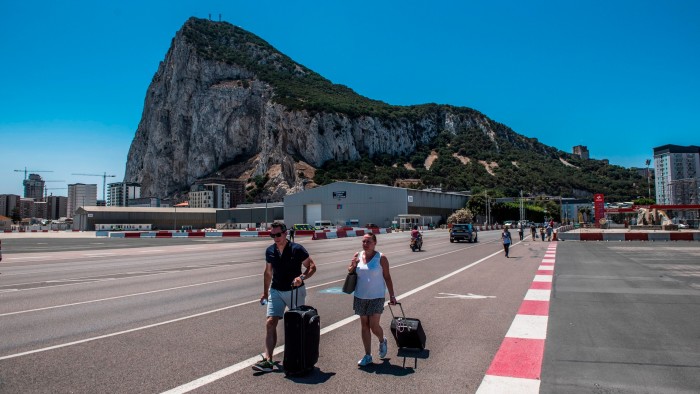Unlock the Editor’s Digest for free
Roula Khalaf, Editor of the FT, selects her favourite stories in this weekly newsletter.
The UK has agreed to let Spanish officials check passports at Gibraltar’s airport and port in return for an open land crossing into Spain, sealing a long-awaited deal on the British territory’s status after Brexit.
London’s concession ended one of the last issues Brexit created and paved the way for Wednesday’s announcement of an agreement between the UK, EU and Spain on Gibraltar’s frontier.
It came after UK foreign secretary David Lammy flew from Gibraltar to Brussels on Wednesday for talks with his Spanish counterpart José Manuel Albares and EU trade commissioner Maroš Šefčovič.
Gibraltar had been in limbo since early 2020 when Brexit came into effect, with London, Brussels and Madrid unable to agree on border issues that had inflamed UK-Spain tensions over the territory’s disputed sovereignty.
The UK — backed firmly by Gibraltar’s chief minister Fabian Picardo — had resisted the presence of Spanish border police on its territory.
But Madrid and the EU insisted Spanish border police were the price the UK had to pay for an open land border between Gibraltar and Spain — in effect making the territory part of the EU’s Schengen free-travel zone.
In a joint statement on Wednesday, the UK, Gibraltar, EU and Spain said: “For the EU, full Schengen checks will be carried out by Spain. For the UK, full Gibraltar checks will continue to be carried out as they are today.”
Albares said Spanish police would be able to turn away British passport holders, for example if they had already hit a 90-day post-Brexit limit on the time they can stay in the EU every 180 days.
“The Spanish police will guarantee the full integrity of the Schengen area and of course Gibraltar is connected with the Schengen zone,” Albares said.
Declaring continental Europe’s “last wall” would be removed, he said the “historic accord” would “benefit above all the 15,000 people who every day move between Gibraltar and [Spain]”.
Spain, which refuses to recognise British sovereignty over Gibraltar, had gained leverage in the talks from its ability to introduce strict passport checks that would choke the daily flow of Spanish workers across the land border to the territory.
Gibraltar will also form a customs union with the EU, removing all physical barriers, checks and controls on persons and goods. The Rock’s 34,000 residents rely on imports of food, medicines and other supplies from Spain.
The territory has also agreed to co-ordinate some taxes to “avoid distortions and contribute to the prosperity of the whole region”, according to the joint statement. Madrid has long alleged Gibraltar is a hub of tax dodging and cigarette smuggling into Spain.
Lammy said the agreement “protects British sovereignty, supports Gibraltar’s economy and allows businesses to plan for the long term once again”.
He said the Labour government inherited a situation from the Conservatives that “put Gibraltar’s economy and way of life under threat. Today’s breakthrough delivers a practical solution after years of uncertainty.”
Conservative shadow armed forces minister Mark Francois said the UK government could not be “trusted to robustly defend any of our overseas interests, as this further concession to Spain shows”.
The Gibraltar negotiations had dragged on for years even though the UK and Spain insisted their opposing stances on which country owned Gibraltar were not up for debate.
Both sides had appeared keen to reach a conclusion as part of a new UK-EU strategic partnership launched at a summit in London in May.
The Spanish crown ceded the territory to the UK in 1713 under the Treaty of Utrecht. While Spain has long tried to reclaim the territory, the overwhelming majority of Gibraltar residents favour British rule.






